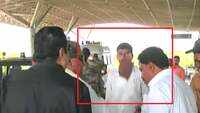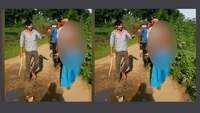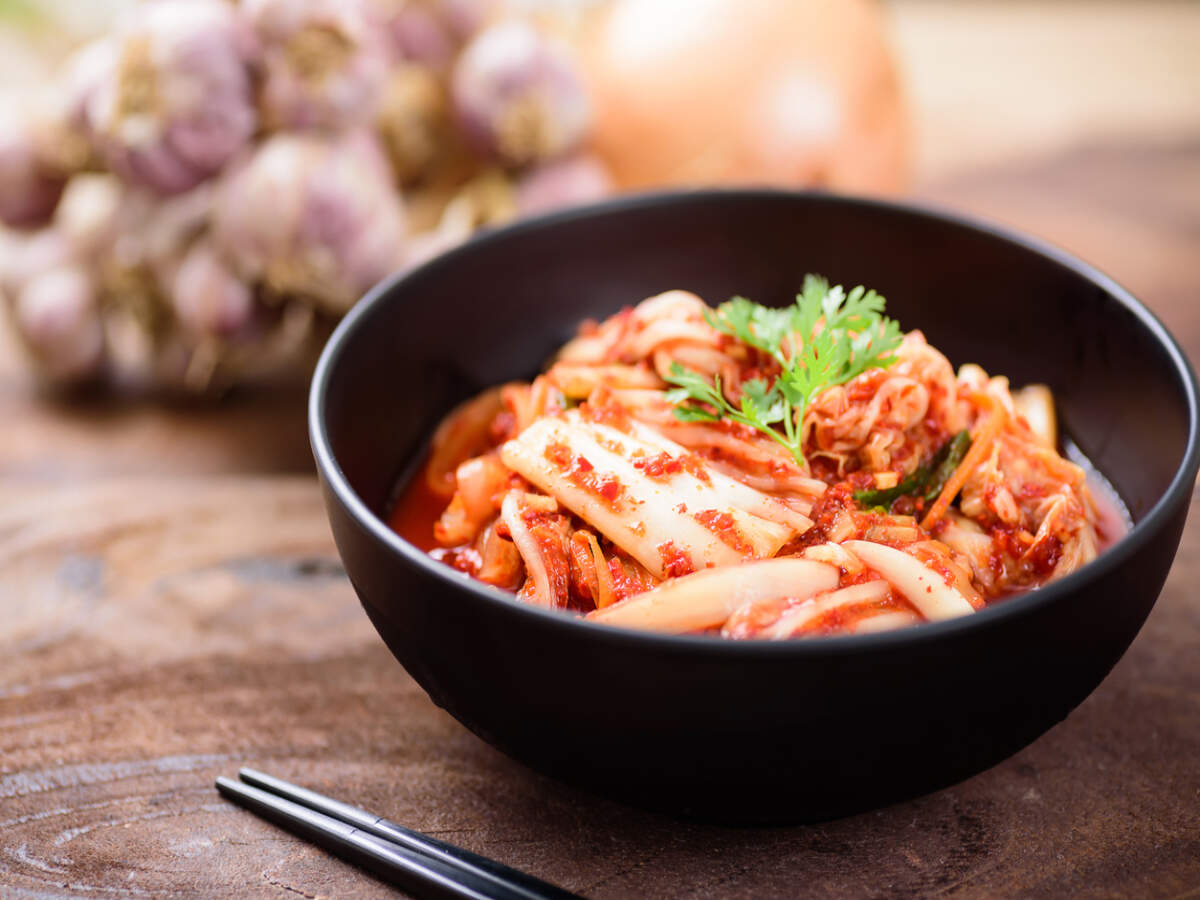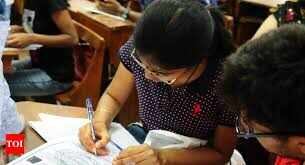
Bhagwanpura (Samrala): Eleven years ago, Charanjit Kaur, then a landless labourer aged 35, was getting increasingly frustrated. With three children to support, she and her husband laboured tirelessly each day doing odd jobs on daily wages, but still found it hard to make ends meet. The situation was so bad that she would be desperate to even have a 100-rupee note in her hand, revealed Charanjit, a resident of Bhagwanpura village in Ludhiana district.
Desperate to provide a better future for her children, Charanjit approached some other women in her village facing similar difficulty and deciding to set up her own enterprise. They formed Guru Arjan Dev Ji self-help group by taking a loan from the Oriental Bank of Commerce. Then, they converted a room at Charanjit’s house into their workplace, bought a sewing machine, and set to work.
Jaswinder Kaur, a member of the self-help group (SHG), said initially, they had about six members and started sewing ‘pallis’ (synthetic covers used for agricultural and domestic purposes) and other types of bags. She informed that earnings remained meagre at the start, owing to the loan they had to pay off. When they approached the bank for a second loan soon after the project started, their request was declined, she informed.
They soon learnt that they could seek training from the Krishi Vigyan Kendra (KVK) of the Punjab Agricultural University (PAU) set up in nearby Samrala town. They enrolled themselves in stitching and embroidery course to enhance their skills, and with the help of KVK, they started showcasing their products at exhibitions and kisan melas (farmer fairs) organised by PAU.
They expanded their product range to include quilts, cushions, purses, curtains, interior decorative articles, mosquito nets, gloves, bedsheets, and covers for washing machine and cars. They also started making a variety of bags — schoolbags, carrybags, backpacks, trolley bags, travel bags, and jute bags.
Bulk orders
The group has 10 members, Charanjit said, adding that the demand for their products increased after they started showcasing them at exhibitions and other fairs. They started getting bulk orders from some firms, factories and government departments, especially for gift bags and luggage bags. “Whenever a bulk order comes, all of us forget food and sleep, and keep working until the products are ready,” said Charanjit.
She informed that they bought more sewing machines at subsidised rates under a government scheme after taking another loan, while some more machines were donated by a local company. The group currently has 10 sewing machines, and has managed to repay their second loan of Rs3 lakh before taking another loan to expand their enterprise and procure additional raw material.
Jaswinder said while most of their raw materials come from Ludhiana, Khanna, and Delhi, the jute comes from Kolkata. She said the start of the new school session is a busy time for them due to the large orders of school bags they receive. She informed that the demand soars during the harvest season, as companies place bulk orders with them. Their clientele comprises residents of the area who usually order for bags and covers, and non-resident Indians (NRIs) who buy quilts when they are visiting home, she revealed.
Adding to family income
With the help of this venture, women are becoming increasingly self-reliant, and are adding to the family income. Every member, on an average, earns around Rs7,500 per month. A group member revealed that their husbands have also started helping them to buy raw materials and transport the finished goods at the time of exhibitions in cities.
As the group started gaining prominence, Charanjit was approached by residents for training. She pointed out that several women from nearby villages, after being trained, have started sewing and repair work on their own. While they charge a nominal fee from these women, those who cannot afford it are trained for free.
The group has won numerous accolades and awards from the state government, including the ‘Best Entrepreneur’ award from the Pendu Vikas and Panchayat Vibhag, and a first prize for the best stall at a farmer fair at PAU. The members of the self-help group said they keep learning new skills by attending workshops at the KVK in Samrala. They have also started putting up traditional mini food courts during the farmer fairs at PAU, where they serve regional delicacies like sarson da saag, makki di roti, and gur di choori.
Children’s self-help group
Incidentally, some of the children of these women have formed their own self-help group and have started an enterprise in catering, bakery, and other home science products, including decorative items. Charanjit highlighted that every woman needs to use the skills she has to earn money and become financially independent.
Last year, three officials from the KVK in Samrala wrote a research report on the success of these women in Innovative Farming, an international agricultural journal. Praising their efforts, the officials noted, “The overall story of the group is very inspirational, and every member is working for a better life.” IANS
Desperate to provide a better future for her children, Charanjit approached some other women in her village facing similar difficulty and deciding to set up her own enterprise. They formed Guru Arjan Dev Ji self-help group by taking a loan from the Oriental Bank of Commerce. Then, they converted a room at Charanjit’s house into their workplace, bought a sewing machine, and set to work.
Jaswinder Kaur, a member of the self-help group (SHG), said initially, they had about six members and started sewing ‘pallis’ (synthetic covers used for agricultural and domestic purposes) and other types of bags. She informed that earnings remained meagre at the start, owing to the loan they had to pay off. When they approached the bank for a second loan soon after the project started, their request was declined, she informed.
They soon learnt that they could seek training from the Krishi Vigyan Kendra (KVK) of the Punjab Agricultural University (PAU) set up in nearby Samrala town. They enrolled themselves in stitching and embroidery course to enhance their skills, and with the help of KVK, they started showcasing their products at exhibitions and kisan melas (farmer fairs) organised by PAU.
They expanded their product range to include quilts, cushions, purses, curtains, interior decorative articles, mosquito nets, gloves, bedsheets, and covers for washing machine and cars. They also started making a variety of bags — schoolbags, carrybags, backpacks, trolley bags, travel bags, and jute bags.
Bulk orders
The group has 10 members, Charanjit said, adding that the demand for their products increased after they started showcasing them at exhibitions and other fairs. They started getting bulk orders from some firms, factories and government departments, especially for gift bags and luggage bags. “Whenever a bulk order comes, all of us forget food and sleep, and keep working until the products are ready,” said Charanjit.
She informed that they bought more sewing machines at subsidised rates under a government scheme after taking another loan, while some more machines were donated by a local company. The group currently has 10 sewing machines, and has managed to repay their second loan of Rs3 lakh before taking another loan to expand their enterprise and procure additional raw material.
Jaswinder said while most of their raw materials come from Ludhiana, Khanna, and Delhi, the jute comes from Kolkata. She said the start of the new school session is a busy time for them due to the large orders of school bags they receive. She informed that the demand soars during the harvest season, as companies place bulk orders with them. Their clientele comprises residents of the area who usually order for bags and covers, and non-resident Indians (NRIs) who buy quilts when they are visiting home, she revealed.
Adding to family income
With the help of this venture, women are becoming increasingly self-reliant, and are adding to the family income. Every member, on an average, earns around Rs7,500 per month. A group member revealed that their husbands have also started helping them to buy raw materials and transport the finished goods at the time of exhibitions in cities.
As the group started gaining prominence, Charanjit was approached by residents for training. She pointed out that several women from nearby villages, after being trained, have started sewing and repair work on their own. While they charge a nominal fee from these women, those who cannot afford it are trained for free.
The group has won numerous accolades and awards from the state government, including the ‘Best Entrepreneur’ award from the Pendu Vikas and Panchayat Vibhag, and a first prize for the best stall at a farmer fair at PAU. The members of the self-help group said they keep learning new skills by attending workshops at the KVK in Samrala. They have also started putting up traditional mini food courts during the farmer fairs at PAU, where they serve regional delicacies like sarson da saag, makki di roti, and gur di choori.
Children’s self-help group
Incidentally, some of the children of these women have formed their own self-help group and have started an enterprise in catering, bakery, and other home science products, including decorative items. Charanjit highlighted that every woman needs to use the skills she has to earn money and become financially independent.
Last year, three officials from the KVK in Samrala wrote a research report on the success of these women in Innovative Farming, an international agricultural journal. Praising their efforts, the officials noted, “The overall story of the group is very inspirational, and every member is working for a better life.” IANS
Trending Topics
LATEST VIDEOS
City
 Former CM Siddaramaiah slaps party worker at an event in Karnataka
Former CM Siddaramaiah slaps party worker at an event in Karnataka  Madhya Pradesh: Young tribal woman beaten up, paraded half-naked over inter-caste affair; video goes viral
Madhya Pradesh: Young tribal woman beaten up, paraded half-naked over inter-caste affair; video goes viral  Caught on cam: Youth Congress leader assaults hotel employee in Madhya Pradesh, pushes him inside drain for not giving matchbox
Caught on cam: Youth Congress leader assaults hotel employee in Madhya Pradesh, pushes him inside drain for not giving matchbox  Suspected of theft, boy thrashed, stripped in Delhi bus
Suspected of theft, boy thrashed, stripped in Delhi bus
More from TOI
Navbharat Times
Featured Today in Travel
Quick Links
Lok Sabha Election Schedule 2019Lok Sabha Election NewsDelhi Capitals teamMI team 2019Rajasthan Royals 2019RCB team 2019Maharashtra Lok Sabha ConstituenciesBJP Candidate ListBJP List 2019 TamilnaduShiv Sena List 2019AP BJP List 2019Mamata BanerjeeBJP List 2019 MaharashtraPriyanka GandhiBJP List 2019 KarnatakaAMMK Candidate List 2019BJP List 2019 WBLok Sabha Elections in Tamil NaduBSP List 2019 UPNews in TamilLok Sabha Poll 2019Satta Matka 2018PM ModiMahagathbandhanNagpur BJP Candidate ListChandrababu NaiduTamil Nadu ElectionsUrmila MatondkarNews in TeluguMadras High CourtTejashwi YadavArvind KejriwalTejasvi SuryaPawan KalyanArvind KejriwalYogi AdityanathJaya PradaSatta King 2019Srinagar encounter
Get the app



